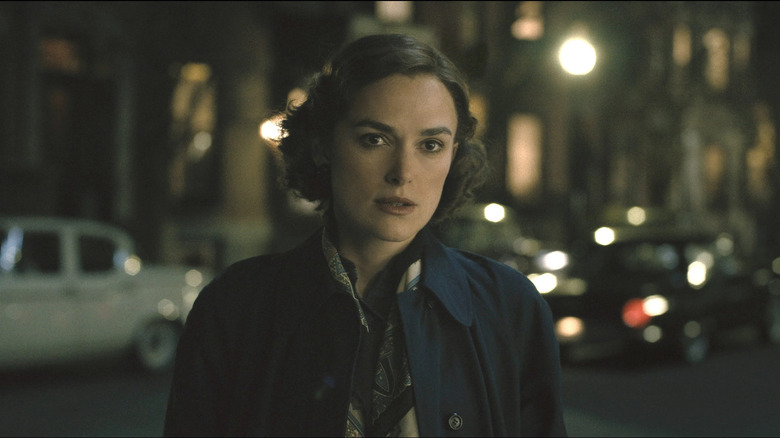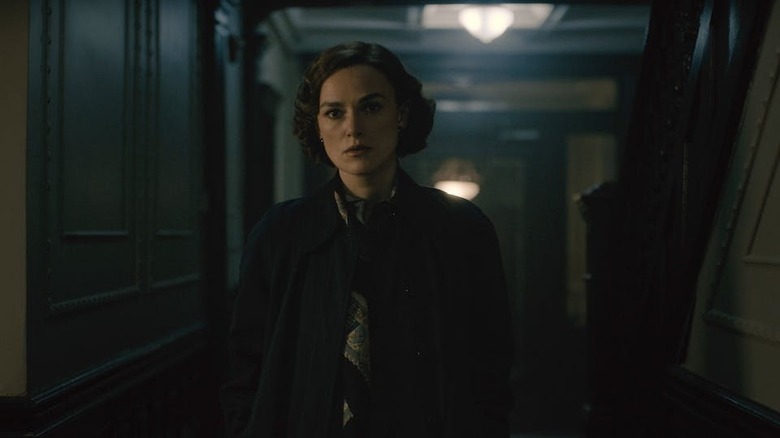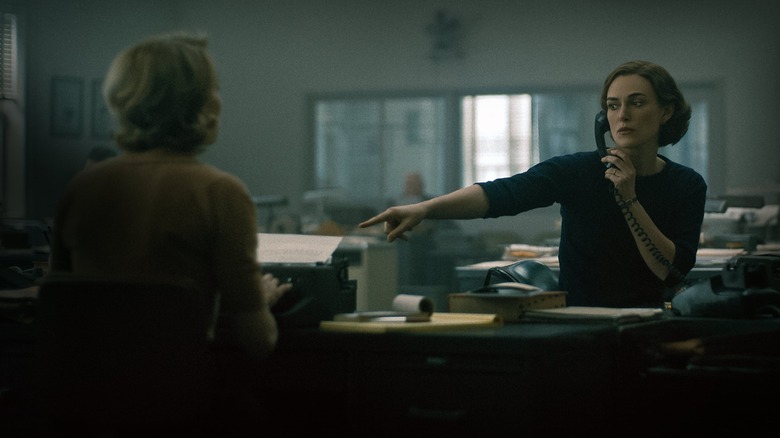Boston Strangler Review: A Journalism Thriller Not Worth Reporting On
- If you're not familiar with the true story, this is an entertaining intro to the story
- It speeds through the plot so fast, it never becomes more of an overview of events than a deep dive
- It's heavily influenced by David Fincher's Zodiac but never puts its characters under the microscope
It was one of the most notorious unsolved serial killer cases in U.S. history, leaving a major city in peril for several years as the bodies kept piling up. When it was transformed into a crime thriller many decades later, it completely reinvented the genre, proving surprisingly rewatchable even as the case it depicted remained open, with no clear answer as to who was responsible.
No, I'm not talking about "Boston Strangler," the new true-crime thriller arriving on Hulu this week, but David Fincher's masterpiece "Zodiac," the movie that casts a looming shadow over this brand new, ripped-from-the-headlines procedural. On more than just a superficial level, director Matt Ruskin's film owes more than a debt to Fincher's modern epic. It similarly attempts to fashion an edge-of-your-seat thriller out of one of the most notoriously unresolved cases in American history, understanding that as much tension can be derived from the lack of breakthroughs in the saga as the overlapping whodunnit.
However, what Ruskin's film lacks in comparison to the much-superior "Zodiac" is a similar sense of historical scale, failing to capture the passage of time in the lives of those focused on catching the killer, which rapidly change as the years go by while the central mystery remains stubbornly at a standstill.
A thriller too lean for its own good
Clocking in at a comparatively lean 112 minutes, "Boston Strangler" flies through months and years within single sequences, keen to arrive at the next pivotal moment in the investigation — even if it means sacrificing exploring its central figures with more depth. As such, it works effectively as intended as a procedural thriller but never transcends that. Without more time spent away from the case to document how it's affected the lives of those covering it in greater detail, all that's left is a crime drama devoid of a satisfying ending.
After we open, bizarrely, in media res after the strangler has resumed their spree in another city many years later, we flash back to 1962, where Loretta McLaughlin (Keira Knightley) is a junior reporter working at the Herald American in Boston. She's intrigued by reports of several seemingly unrelated killings bound by strange overlapping details and hopes to cover in the place of the seemingly uninterested (and, crucially, all-male) crime reporters. Naturally, her boss (Chris Cooper) shuts her down and demands she gets on with her daily duties, writing fluffy reviews of household appliances for the weekend supplements. However, she soon finds her way in, challenging the sexist hierarchy in the office, and lands a front-page scoop that breaks the case out into the open and captures national attention as the death toll starts increasing further.
At this point, I need to stress that the entire narrative's worth of events described above unfolds onscreen within the first 15 minutes. Ruskin moves breathlessly from one plot point to the next, not stopping to dwell too much on the various fascinating themes inherent in this story; the examination of institutionalized sexism, which should be front and center in any account of the groundbreaking reporting of this case, isn't explored outside of how it affects the central investigation, never analyzed from any angle that doesn't serve to push the story forward. On the one hand, it's easy to admire Ruskin's approach to storytelling, ensuring there's no fat on the bones of the story he's telling — but that efficiency comes at the expense of a much more rewarding meal.
Never escapes the shadow of Zodiac
If you've seen his directorial debut — the 2017 Sundance prize winner "Crown Heights" — you'll know that Ruskin has previously shown a preference for condensing decades-spanning true stories into fast-paced narratives. Adapted from an episode of the podcast "This American Life," that effort dramatized the 20-year incarceration of a man falsely convicted of murder but breezed through those decades at such a pace that the weight of all those years behind bars was never keenly felt (despite the best efforts of its ever-brilliant lead actor, Lakeith Stanfield). Again, it's commendable that a writer-director prioritizes economical storytelling, but some real-life stories deserve to be told on a grander scale than a 94-minute feature — as that film was — can allow, and the richness of their tales become an afterthought when their life stories are sped through at such a rapid clip.
"Boston Strangler" does, in comparison, gives its story some room to breathe by the time we arrive in the second half when both McLoughlin and co-reporter Jean Cole (Carrie Coon) arrive at an impasse in their reporting. Despite breaking several national scandals about law enforcement's severe mishandling of the case, no third parties assigned to take a second look can achieve a breakthrough either, and the number of murders committed sharply decreases. It's the stage in the film that most successfully examines the home lives of its reporters, and the most apparent in its "Zodiac" influence — even if its lead reporter's obsession never gets to the self-destructive levels of Jake Gyllenhaal's cartoonish Robert Graysmith.
Prior to this point, the personal life of McLoughlin is depicted almost entirely within sequences where she takes work calls at home, a broad-strokes method to show how her husband goes from being initially supportive to angry that she's missing out on family time, without having to devote a scene to something irrelevant to the plot itself. Ruskin has a talent for weaponizing exposition in this way, removing all the shoe leather of the scene and conveying the state of character relationships via single lines of dialogue before quickly moving on. It would be commendable if it weren't so dramatically unsatisfying.
The second half is a considerable improvement, proving more effective as a crime procedural when there aren't several years' worth of whirlwind events to race through. Yes, the study of obsession and frustration over an unsolved case does pale in comparison to that of "Zodiac," but even as a comparatively straightforward thriller without the same loftier aims as Fincher's film, its component parts still prove more satisfying when given a bit more room to breathe.
Of course, "Boston Strangler" is designed as much more of a popcorn thriller, and it does succeed on those terms. As someone who was unfamiliar with the real story prior to viewing, I found myself gripped throughout — I also found myself heading on a Wikipedia deep dive immediately after viewing to soak up the various details the film either skimmed over or skipped entirely.
"Boston Strangler" arrives on Hulu on Friday, March 17.


